
The Battle of Liaoyang was a major land battle of the Russo-Japanese War, on the outskirts of the city of Liaoyang in present-day Liaoning Province, China. The city was of great strategic importance as the major Russian military center for southern Manchuria, and a major population center on the main line on the Russian South Manchurian Railway connecting Port Arthur with Mukden. The city was fortified by the Imperial Russian Army with three lines of fortifications.

The Battle of Nanshan, also known as the battle of Jinzhou or Chinchou, was one of many vicious land battles of the Russo-Japanese War. It took place on 24–26 May 1904 across a two-mile-wide defense line across the narrowest part of the Liáodōng Peninsula, covering the approaches to Port Arthur and on the 116-meter high Nanshan Hill, the present-day Jinzhou District, north of the city center of Dalian, Liaoning, China.

The siege of Port Arthur was the longest and most violent land battle of the Russo-Japanese War.

Wilhelm Withöft, more commonly known as Wilgelm Vitgeft, was a Russia-German admiral in the Imperial Russian Navy, noted for his service in the Russo-Japanese War of 1904-1905.

Anatoly Mikhaylovich Stessel was a Russian baron of German descent, military leader, and general.

Oskar Ferdinand Gripenberg was a Finnish-Swedish general of the Russian Second Manchurian Army during the Russo-Japanese War.
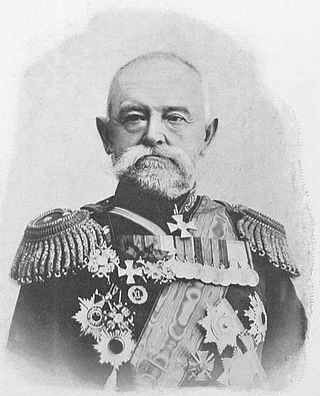
Nikolai Petrovich Linevich, also Lenevich and Linevitch was a career military officer, General of Infantry (1903) and Adjutant general in the Imperial Russian Army in the Far East during the latter part of the Russo-Japanese War.
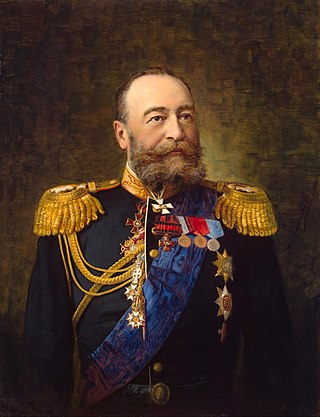
Yevgeni Ivanovich Alekseyev or Alexeyev was a Russian admiral in the Imperial Russian Navy, viceroy of the Russian Far East, and commander-in-chief of Imperial Russian forces at Port Arthur and in Manchuria during the first year of the Russo-Japanese War of 1904-05.
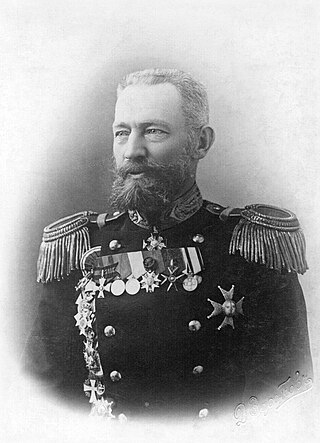
Vice Admiral Karl Johann Peter Jessen was a Baltic German admiral in the Imperial Russian Navy during the Russo-Japanese War.
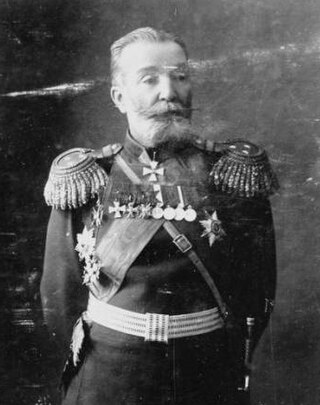
Alexander Viktorovich Fok was a Russian lieutenant general of the Imperial Russian Army during the Russo-Japanese War.

Nikolai Aleksandrovich Tretyakov was a military engineer and general in the Imperial Russian Army, noted for his heroic role in the Siege of Port Arthur during the Russo-Japanese War.

Mikhail Ivanovich Zasulich was a general in the Imperial Russian Army, noted for his role as commander of the Russian 2nd Siberian Army Corps in the Battle of the Yalu River, of the Russo-Japanese War of 1904–1905.

Nikolay Aleksandrovich Kashtalinsky was a general in the Imperial Russian Army during the late 19th and early 20th centuries. He fought in the Russo-Turkish War (1877-1878), Russo-Japanese War of 1904–1905, and in World War I.

Georg August Paul Freiherr von Stackelberg was a Baltic German cavalry general in the service of the Imperial Russian Army. He was noted for his role during the Russo-Japanese War, especially during the Battle of Sandepu, in which he was awarded the Order of St. George afterwards.

Baron Alexandr Alekseyevich Gerngross was a general of Dutch descent who served in the Imperial Russian Army during the late 19th and early 20th centuries.

Baron Alexander Alexandrovich Bilderling, better known as Baron Alexander Alexandrovich von Bilderling, was a Russian general of Baltic German descent, noted for his role in the Russo-Japanese War and as an artist and monument designer.

Pyotr Alekseyevich Bezobrazov was an admiral in the Imperial Russian Navy.
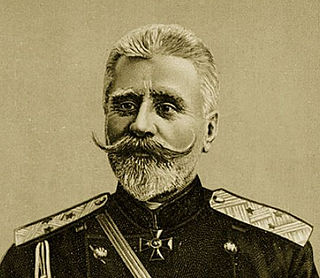
Konstantin Nikolaevich Smirnov was a Russian general in the Imperial Russian Army.
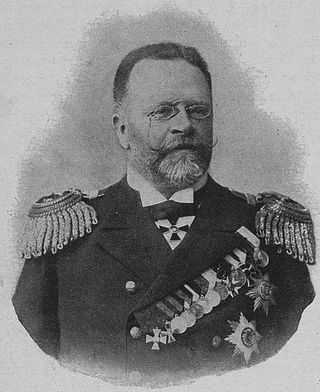
Nikolai Illarionovich Skrydlov, was an admiral in the Imperial Russian Navy.

Robert Nikolayevich Viren, also known as Robert Reinhold von Wirén, was a Baltic German career naval officer in the Imperial Russian Navy, noted for his role in the Russo-Japanese War of 1904–1905.





















